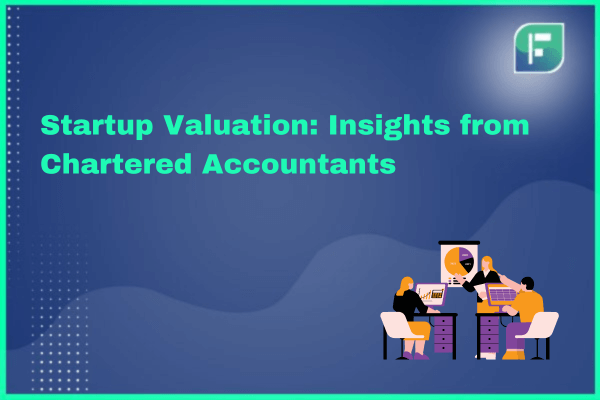In the growing world of entrepreneurship, determining startup valuation is no easy feat. Unlike mature companies with extensive performance histories, early-stage ventures lack financial track records, have unproven business models, and operate in realms of uncertainty. This makes valuation more important in projecting success.
Amidst this, chartered accountants serve as experts guiding all stakeholders – founders, investors, and advisors – towards informed decision making. With their specialised financial training, rigorous analytics, and strategic perspectives, chartered accountants make sense of complexity, showing the pathways to deal with risk and capitalise on upside potential.
Understanding Startup Valuation
Unlike established companies, valuing early-stage startups requires dealing with significant uncertainty given their lack of financial track records and unproven business models. Traditional valuation approaches like discounted cash flow analysis can fall short when historical data is sparse and future projections highly variable. Startups operate in fluid environments where the path to profitability can shift at a moment’s notice.
Seasoned investors and financial analysts fill in the gaps through experience and pattern recognition. They benchmark valuations of seemingly comparable startups, factoring in differences in founding teams, products, and markets. Things like progress towards prototypes, IP portfolios and traction with early adopters help to know the readiness for commercialisation and end-market adoption.
Management quality and strategic relationships also impact execution ability. Investors must ultimately Develop reasonable assumptions across drivers of growth, costs, and investment requirements over multi-year projections, quantifying an appropriate risk-adjusted valuation range. Probability analysis and scenario planning help stress test key assumptions.
The Role of Chartered Accountants
The role of chartered accountants in startup valuation can be understood as:
Chartered accountants serve as invaluable guides in the world of startup valuation, armed with financial knowledge with rigorous training. They bring an external, independent perspective to help founders and investors alike navigate uncertainty and derive meaningful insights from limited data.
Rather than a point estimate, chartered accountants focus on establishing reasonable valuation ranges based on both quantitative and qualitative factors. These include assessment of managerial experience, product/service readiness, IP protection, market traction, competitive forces and access to strategic partners.
Ongoing mentoring around financial planning and modelling builds startup capabilities while ensuring transparency and monitoring on agreed milestones.
Over time, chartered accountants pivot to benchmarking actual performance relative to projections across key business drivers – revenue growth, customer acquisition costs, burn rates and capital efficiency. Course corrections get advised as needed while recasting valuation models.
With their specialised expertise and independent counsel, chartered accountants thus help startups and investors make informed decisions under uncertainty during dynamic phases of company evolution and growth.
Understanding the Startup Valuation Methods
Given below are the various startup valuation methods from chartered accountants:
1. Market Comparable Analysis
- Chartered accountants utilise the market comparable approach, also known as the relative valuation method, to benchmark a startup’s valuation multiple against similar publicly listed firms or recent M&A transactions. This allows assessing fair value relative to peers.
- Key factors examined include revenue growth, margins, customer traction, addressable market size and growth runway. Adjustments account for differences in business models, geographies, management team calibre and technology maturity.
- This method offers easiest applicability when reliable data exists for comparable companies. Its accuracy depends heavily on the level of similarity of the selected benchmark companies across various financial and operational dimensions.
2. Discounted Cash Flow Analysis
- A detailed discounted cash flow model projected over 5-10 years allows estimating a startup’s intrinsic value based on free cash flows discounted to present value at the cost of capital.
- Chartered accountants scrutinise assumptions on revenue growth cadence, customer acquisition costs, operating margins, capital intensity and working capital dynamics to ensure alignment with industry benchmarks and startup operating realities at various growth stages.
- A discounted cash flow model enables capturing technology/product life cycle effects, changing competitive dynamics and realistic growth tapering beyond initial exponential phases. Terminal value determination further uses multiple cross-checks for accuracy.
3. Scorecard Valuation Method
- The scorecard methodology evaluates startups based on multiple weighted criteria spanning team, product, business model, market traction, market size, competitive differentiation and scalability.
- Chartered accountants drive consistency in applying criteria weights and scoring to minimise subjectivity. It allows benchmarking progress startups make across well-defined milestones.
- The scorecard approach, popular with early stage investors, balances quantitative metrics with qualitative judgments of a startup’s potential prior to demonstrated commercial success and revenue generation.
4. Real Options Valuation
- Real options valuation allows quantifying the value of managerial flexibility and account for contingencies in startup valuation models built by chartered accountants.
- Key real options would include deferring, scaling or abandoning projects contingent upon market reception and competitive threats. This captures the multi-stage capital infusion options embedded in startup financing structures.
- Chartered accountants use real options valuation to right-size downside risk and determine option value of innovations still under development which promise potential but currently lack market validation.
5. Valuation by Stage of Business
- Chartered accountants tailor the valuation approach to a startup’s current stage – seed stage, early traction, scaling growth, establishment, expansion etc.
- During the seed stage, milestone-based valuation dominates, assessing product-market validation. Revenue multiples apply once commercial traction gets demonstrated in early stages. Mature startups get valued on profit multiples and assets.
- Stage-specific valuation methods allow chartered accountants to benchmark progress startups achieve in their life cycle, facilitating realistic value determination.
Final Thoughts
Dealing with the world of entrepreneurship requires a strong startup valuation compass to guide stakeholders towards fruitful results. Chartered accountants serve as those expert navigators, distilling signals from noise when uncertainty abounds. They empower investors and founders alike to develop reasonable expectations, make informed decisions, and chart adaptable courses to startup success.
Using established principles with strategic foresight, chartered accountants draw upon analytical rigour and real-world wisdom to drive startups forward. Their independent guidance and specialty expertise make them invaluable partners through the exhilarating yet unpredictable journey of value creation.






